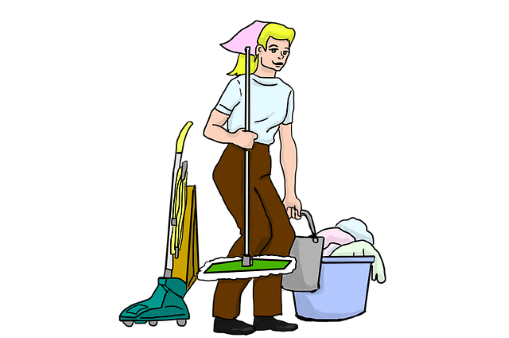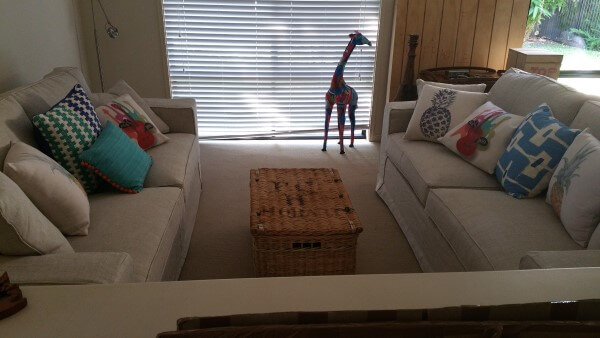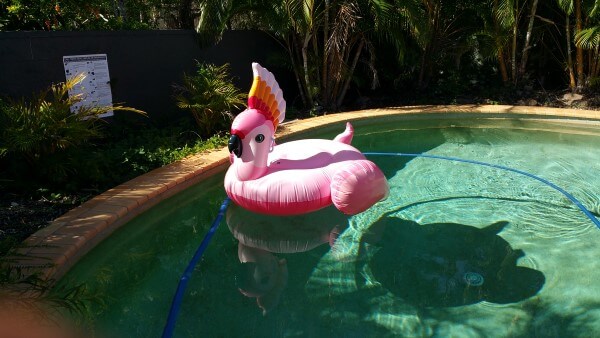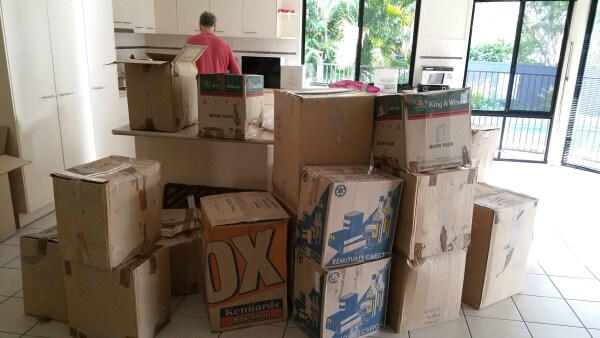Moving house scores 20 on the Holmes and Rahe Stress Scale. If you are moving as part of your retirement plans then your stress levels might be even higher; retirement in itself is considered by many as number 10 in the 10 most stressful life events. Here are our tips and a checklist for minimising stress for your next move.
1. A long settlement period
If you are selling an existing residence, and if it is possible, negotiate a long settlement period for both your current and new residences. For our recent move from Mallacoota to Noosaville we agreed a 120 day settlement on our Mallacoota property which significantly reduced our stress, allowing us plenty of time to plan and execute our move.
2. Declutter then declutter some more
Use your settlement period to ruthlessly declutter your possessions. We thought we had been quite ruthless, but on our arrival at our new home we realised we needed to declutter even more. Many of those decisions are difficult, but pared back possessions which will fit well in your new home can create a harmonious sense of old and new. Allow yourself to move on in every sense of the word.
3. Use checklists for everything
We ran Excel spreadsheet checklists for major tasks like changes of address, connection and disconnection of services etc. You can download our moving house checklist and edit it to meet your own needs. As well, we ran a spreadsheet with a line for every part of the house that needed to be packed. When a cupboard was packed it was ticked off the list.
4. Clean as you pack
We cleaned as we went, once a cupboard was packed up it was then cleaned. This was also noted on the packing spreadsheet. We did use a cleaner to do a final exit clean but it saved us a lot of money to have most internal shelving clean as part of the packing process. And on the cleaning note, we found Eucalyptus Oil to be our greatest friend, particularly on white melamine; sticky marks just disappeared like magic.

5. Wrap and pack each item carefully
Don’t use newspaper, it will leave dirty marks all over your possessions. We were fortunate to secure second hand packing boxes and paper to meet our needs. We double wrapped precious things and put aside a box of hand blown glasses to travel in our car. We also had wooden crating tailor made for two pieces of art. Stock up on quality packing tape (clear is generally better quality than the brown stuff), as well as thick permanent markers in black and red. Also, choose appropriate boxes for different items; don’t break your back or stress your removalists by using large boxes for books, wine boxes are ideal for those.
6. Label every box clearly
On each box record your name/s, destination address, which room the box is to be delivered to and what the contents are. Take particular care to detail which box essential items are in – you don’t want the kettle to be in any one of 10 kitchen boxes; you will be wanting a cup of tea. You may wish to number your boxes, some people do, we had far too many to be bothered with that. If a box has fragile contents and/or needs to be stored upright or on top of rather than under other boxes, use your red marker to make that clear.
7. Choose your removalists carefully
Research removalists and if possible meet them face to face before making a final selection. Can they meet your timelines and specific needs? If you need goods stored are they able to do that, and will that be secure. Make sure too that you understand what their insurance does and does not cover. We had our goods put into a container which was stored on the removalists’ property for a couple of weeks before being delivered to our new home. The container was ideal as things didn’t need to be unpacked at their premises. However, the goods were not covered by the removalists’ insurance except whilst in transit. We organised for our content insurance to cover our possessions for the time they were in storage, so do check this out.

8. Have an ‘on arrival’ box and take it with you
Make sure you have a box with you that contains essential items for when your goods arrive. Not just tea and headache tablets :-), you will also need a stanley knife or two for opening boxes, and perhaps a toolkit with screwdrivers, allen keys etc. for assembling beds. We also found having a small portable vacuum cleaner was great for keeping rooms tidy as we unpacked.
9. Have a clear agreement on priorities for arrival
We were very clear that our top priority was to have our bed made and our bedroom relatively clear on our first night. Bed linen, towels, perhaps a beautiful soap etc. needed to be close at hand, as did drinking glasses for copious amounts of water, and a bottle of wine for the end of the day. Your list might be different but so long as you are clear on your priorities then you will be OK. Perhaps too you might plan to eat out on your first night whilst your fridge is cooling down and your kitchen essentials are not yet all unpacked.
10. Don’t try and do everything on the first day
Remember where we started; moving house is stressful. Take your time to find new homes for each item. Two weeks after moving in we still have unpacked boxes but we are fine with that. We have all our essentials plus a few luxuries, and we have some calm uncluttered spaces to relax in; the rest is being dealt with on a bit by bit basis.

11. Know that things will go wrong
With the best will in the world you will almost certainly have some challenges and removalists, even good ones, won’t get everything right. We had a broken wine glass and a cracked noodle bowl, and put that down to bad luck. Also whilst our cutlery was clearly labelled on the box and was designated Kitchen for unloading, because it was a relatively small box it got put into some tubs and left in our garage behind other stuff. It took us about a week to track that down. Fortunately we had a small set of cutlery with us on arrival.
12. Take time to enjoy your new home
We are very fortunate to have a pool at our new home. We made sure that every day during the unpacking we took at least a few minutes to enjoy a quick dip and a soak in the sun. We also planned some walking and other activities in the local area so that life wasn’t all work and no play.

Thinking about a change but not sure how to choose your ideal retirement location?
inking about a change but not sure how to choose your ideal retirement location?
Have you moved house recently? Got tips to share with us? Did it go smoothly or did you have challenges?




